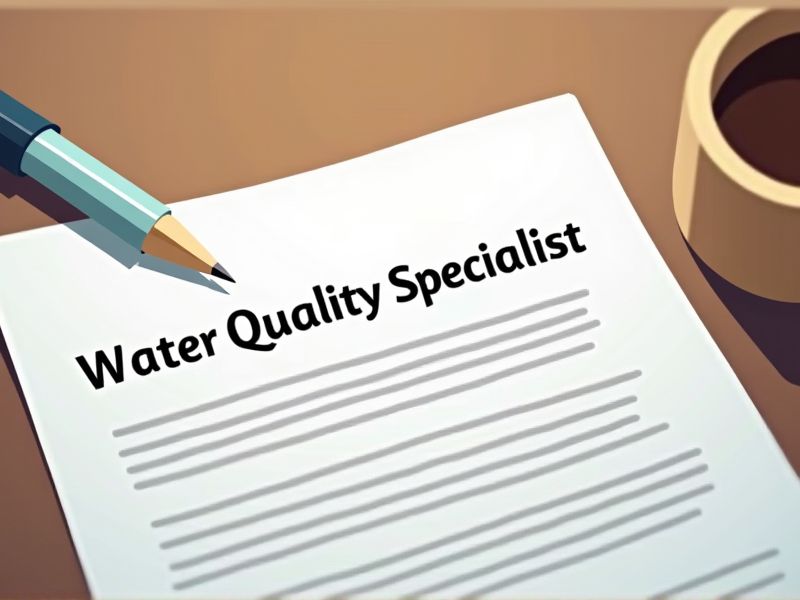
Water quality specialists are responsible for ensuring the safety and purity of water sources, which requires specialized knowledge and skills. Certifications demonstrate a professional's competence in water treatment processes, environmental regulations, and safety protocols. Without proper certifications, a specialist may lack the necessary credibility and expertise to address complex water quality issues. Here are some key certifications you may consider for a career in water quality specialization.
Certified Water Quality Specialist (CWQS)
A Certified Water Quality Specialist (CWQS) ensures adherence to regulatory standards, thereby preventing public health risks associated with contaminated water. Certification provides evidence of expertise, enhancing trust among communities and stakeholders concerned about water safety. CWQS professionals apply specialized knowledge to develop efficient and sustainable water treatment solutions, addressing both current and emerging water issues. By maintaining certification, these specialists remain updated on the latest water quality advancements and technologies, facilitating continuous improvement in water management practices.
Certified Drinking Water Specialist (CDWS)
Certified Drinking Water Specialists provide expertise in assessing and ensuring the quality of water, which directly impacts public health safety. Their specialized knowledge helps in identifying contaminants and employing effective treatment solutions, thereby reducing potential health risks. Regulatory compliance requires detailed understanding and application of evolving water quality standards, for which a CDWS is well-equipped. Their expertise aids in implementing sustainable water management practices, addressing both current and future challenges in water safety and accessibility.
Certified Water Quality Technician (CWQT)
The role of a Certified Water Quality Technician (CWQT) strengthens the accuracy of water quality assessments, ensuring compliance with environmental regulations. Their certification brings specialized knowledge, allowing them to effectively analyze and address potential contaminants. Employing CWQT professionals reduces the risk of health issues, as they implement tested procedures for clean water standards. The presence of certified technicians often results in more efficient resolution of water quality issues, maintaining public trust and safety.
Drinking Water Operator Certification (DWOC)
Drinking Water Operator Certification (DWOC) ensures that Water Quality Specialists possess the necessary knowledge to manage and treat water effectively. Compliance with DWOC requirements helps specialists adhere to public health and safety standards. Certification instills public trust by demonstrating the specialist's commitment to maintaining safe drinking water. Legal frameworks often mandate certifications like DWOC to ensure industry accountability and competence.
Certified Water Treatment Plant Operator (CWTO)
The expertise of a Certified Water Treatment Plant Operator ensures that water treatment processes comply with strict regulatory standards, safeguarding public health. Precise knowledge of chemical dosages and mechanical systems possessed by a CWTO leads to effective contaminant removal and system optimization. Experienced operators play a crucial role in crisis situations, accurately diagnosing and addressing system failures or contamination events. Regular data collection and analysis by a CWTO facilitate informed decision-making and continuous improvement in water quality management.
Water Distribution Operator Certification (WDOC)
A WDOC ensures that a Water Quality Specialist has the technical knowledge and skills necessary to maintain safe and compliant water systems. Certification often results in adherence to regulatory standards, which reduces potential health risks associated with water contamination. The process of obtaining certification involves rigorous training, leading to informed decision-making and efficient operational practices. Certified professionals are more likely to implement advanced technologies and methodologies, which can enhance system performance and water quality.
Certified Environmental Scientist (CES)
The use of a Certified Environmental Scientist (CES) enhances data collection accuracy, leading to more reliable water quality assessments. CES certification provides specialized knowledge in environmental laws and regulations, aiding compliance and reducing legal risks. Trained in advanced analytical techniques, a CES can identify contaminants and propose effective remediation strategies. Experience in ecosystem dynamics enables a CES to forecast environmental impacts, guiding sustainable water management decisions.
Certified Environmental Professional (CEP)
Certified Environmental Professionals (CEP) in water quality ensure adherence to regulatory standards, which directly affects compliance with environmental laws. Expertise gained from certification enhances the accuracy of water quality assessments, leading to more effective pollution management strategies. Certified specialists contribute to sustainable resource management by identifying potential contamination sources and mitigating their impacts on ecosystems. Their specialized knowledge aids in informed decision-making, leading to improved public health outcomes by ensuring safe and clean water supplies.
Certified Hazardous Materials Manager (CHMM)
Water Quality Specialists rely on Certified Hazardous Materials Managers to ensure compliance with environmental regulations, as they identify and safely manage hazardous materials that could contaminate water sources. A CHMM provides expertise in assessing risks and implementing control measures, preventing pollutants from entering water systems. They possess knowledge in emergency response, crucial for mitigating potential incidents that may impact water quality. Certified managers aid in developing and executing sustainable practices, thereby safeguarding public health and environmental integrity.
AWWA Water Quality Certification
The AWWA Water Quality Certification provides standardized criteria that ensure a Water Quality Specialist possesses the necessary knowledge and skills to maintain safe water standards. Certification aligns specialists with industry best practices, reducing the risk of contamination and health issues due to waterborne diseases. It enables professionals to stay updated with regulatory changes and technological advancements in water treatment. Employers often require this certification to demonstrate a commitment to excellence and public safety in water management.
Summary
You can anticipate improved water management skills from a certified Water Quality Specialist, ensuring safer water conditions for communities. Enhanced credentials often lead to trust and credibility, fostering collaboration with stakeholders. Certified specialists typically apply advanced technologies and strategies, optimizing resource use and reducing pollution. Certification generally increases job opportunities and career advancement, attracting talent investment.
